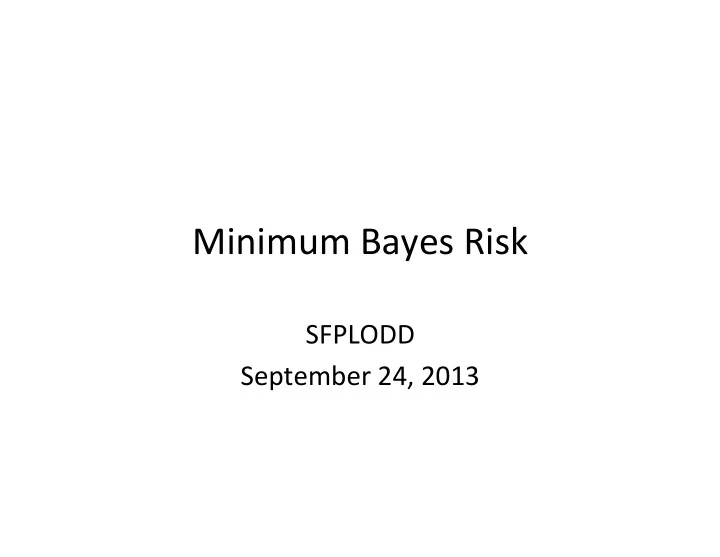

Minimum ¡Bayes ¡Risk ¡ SFPLODD ¡ September ¡24, ¡2013 ¡
Some ¡Things ¡You ¡Know ¡ • How ¡to ¡decode ¡by ¡finding ¡the ¡single ¡best ¡ global ¡structure ¡ – Lots ¡of ¡ways ¡to ¡think ¡about ¡the ¡algorithms ¡ • How ¡to ¡find ¡posterior ¡marginals ¡for ¡ “parts” ¡(a.k.a. ¡“cliques”), ¡if ¡we ¡interpret ¡ scoring ¡probabilisQcally ¡
A ¡Different ¡View ¡of ¡Decoding ¡ • Cost ¡(someQmes ¡called ¡“loss”): ¡ ¡a ¡funcQon ¡that ¡ tells ¡how ¡bad ¡every ¡guess ¡y ¡is, ¡given ¡every ¡correct ¡ answer ¡y*: ¡ cost ¡: ¡Val(Y) ¡× ¡Val(Y) ¡→ ¡[0, ¡∞) ¡ • Risk : ¡ ¡pretend ¡Y* ¡is ¡random ¡and ¡distributed ¡ according ¡to ¡your ¡model ¡distribuQon; ¡risk ¡is ¡the ¡ expectaQon ¡of ¡cost, ¡for ¡a ¡given ¡y: ¡ risk: ¡Val(Y) ¡→ ¡[0, ¡∞) ¡ • MBR ¡decoding : ¡ ¡pick ¡the ¡y ¡that ¡minimizes ¡risk. ¡ p ( y ∗ | x ) × cost( y , y ∗ ) X arg min y y ∗ ∈ Y
DerivaQon ¡ X y E p ( x , Y ∗ ) [cost( y , Y ∗ )] = min p ( x , y ∗ ) × cost( y , y ∗ ) min y y ∗ ∈ Y p ( x ) × p ( y ∗ | x ) × cost( y , y ∗ ) X = min y y ∗ ∈ Y p ( y ∗ | x ) × cost( y , y ∗ ) X = p ( x ) × min y y ∗ ∈ Y
Example ¡1: ¡ ¡Posterior ¡Decoding ¡ • model: ¡ ¡sequence ¡labeling ¡with ¡bigram ¡label ¡factors ¡ • cost(y, ¡y*): ¡ ¡number ¡of ¡tokens ¡you ¡mislabeled ¡ (someQmes ¡called ¡“Hamming” ¡cost) ¡ • risk(y): ¡ ¡expected ¡number ¡of ¡mislabeled ¡tokens ¡in ¡y ¡ ¡ " n ¡ # n p ( y ∗ | x ) X X X 1 { y i 6 = y ∗ i } = E p ( Y ∗ | x ) 1 { y i 6 = Y ∗ i } ¡ ¡ y ∗ i =1 i =1 n X = E p ( Y ∗ | x ) [ 1 { y i 6 = Y ∗ i } ] i =1 n X � � = 1 � E p ( Y ∗ | x ) [ 1 { y i = Y ∗ i } ] i =1
Example ¡2: ¡ ¡0-‑1 ¡cost ¡ • model: ¡ ¡anything ¡ • cost(y, ¡y*): ¡ ¡0 ¡if ¡y ¡= ¡y*, ¡1 ¡otherwise ¡ • risk(y): ¡ ¡1 ¡– ¡p(y ¡| ¡x) ¡ ¡
Example ¡2: ¡ ¡0-‑1 ¡cost ¡ • model: ¡ ¡anything ¡ • cost(y, ¡y*): ¡ ¡0 ¡if ¡y ¡= ¡y*, ¡1 ¡otherwise ¡ • risk(y): ¡ ¡1 ¡– ¡p(y ¡| ¡x) ¡ ¡
Example ¡3: ¡ ¡Maximum ¡Expected ¡Recall ¡ (Goodman, ¡1996) ¡ • model: ¡ ¡PCFG ¡ • cost(y, ¡y*) ¡= ¡number ¡of ¡labeled ¡spans ¡in ¡y* ¡ that ¡are ¡not ¡in ¡y ¡ • risk(y) ¡= ¡sum ¡of ¡ ¡ (1 ¡-‑ ¡posterior ¡probability ¡of ¡a ¡labeled ¡span) ¡
Example ¡4: ¡ ¡WeighQng ¡Different ¡BIO ¡ Errors ¡ • model: ¡ ¡BIO ¡ • cost: ¡ ¡different ¡costs ¡for ¡recall, ¡precision, ¡and ¡ boundary ¡errors: ¡ correct: ¡ B-‑B ¡ B-‑I ¡ B-‑O ¡ I-‑B ¡ I-‑I ¡ I-‑O ¡ O-‑B ¡ O-‑O ¡ B-‑B ¡ split ¡ prec. ¡ split ¡ prec. ¡ prec. ¡ B-‑I ¡ merge ¡ bound. ¡ merge ¡ bound. ¡ bound. ¡ bound. ¡ B-‑O ¡ recall ¡ recall ¡ recall ¡ bound. ¡ recall ¡ I-‑B ¡ split ¡ prec. ¡ split ¡ prec. ¡ prec. ¡ I-‑I ¡ merge ¡ bound. ¡ merge ¡ bound. ¡ bound. ¡ bound. ¡ I-‑O ¡ recall ¡ recall ¡ recall ¡ bound. ¡ recall ¡ O-‑B ¡ prec. ¡ prec. ¡ bound. ¡ prec. ¡ prec. ¡ O-‑O ¡ recall ¡ recall ¡ recall ¡ recall ¡
General ¡MBR ¡Algorithm ¡ Assump4on : ¡ ¡cost ¡factors ¡locally ¡into ¡parts ¡ 1. Calculate ¡posterior ¡distribuQon ¡for ¡each ¡part ¡ (generalized ¡inside ¡algorithm) ¡ 2. If ¡parts ¡don’t ¡overlap, ¡pick ¡local ¡argmax ¡for ¡ each ¡part. ¡ 3. Otherwise, ¡decode ¡with ¡a ¡model ¡that ¡ defines: ¡ ¯ f j, π ( π 0 ) = − localcost( π , π 0 ) w j, π = p (part j = π | x ) ¯
Pop ¡Quiz ¡ Can ¡you ¡think ¡of ¡a ¡cost ¡funcQon ¡such ¡that ¡ minimum ¡Bayes ¡risk ¡decoding ¡ can’t ¡be ¡done ¡in ¡ polynomial ¡Qme? ¡
Recommend
More recommend